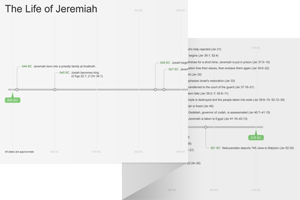41:1–18 Gedaliah, the Judaean governor appointed by Babylon, is assassinated, and Mizpah becomes the scene of a chaotic massacre. Ishmael lures 80 pilgrims into the city, where he and his men slaughter 70 of them—sparing 10 who bribe them with the promise of food. The people who remained in Mizpah under Gedaliah’s protection are then taken hostage as Ishmael flees to the Ammonites. Johanan pursues, overtaking the group and recovering the hostages, but Ishmael escapes with eight men. |
41:1 in the seventh month Autumn. The year is often assumed to be 586 bc, the same year as the fall of Jerusalem. If that is the case, then Gedaliah was governor for only about four months. Alternatively, he may have served for several years and his assassination might have inspired the deportation in 582 bc (described in 52:30).
 Israelite Calendar Table
Israelite Calendar Table
And they ate bread together there at Mizpah Describes a traditional offer of hospitality. Gedaliah trusted Ishmael, refusing to believe Johanan’s report that Ishmael intended to kill him (40:16).
at Mizpah A city about 8 miles north of Jerusalem. See note on 40:6.
41:3 all the Judeans Ishmael also kills Gedaliah’s Judaean supporters—as well as some Babylonian soldiers, who likely were stationed at Mizpah to help maintain order.
41:5 from Shechem, from Shiloh, and from Samaria Religious pilgrims from three Israelite cities. The seventh month was the time of the Feast of Tabernacles.
who had cut themselves with blades Shaving, tearing clothes, and cutting the body were practices involved in mourning rituals. The pilgrims might have been lamenting the destruction of Jerusalem and the loss of the temple. See note on Deut 14:1.
grain offerings and frankincense The site of the temple was still considered holy and continued to be used for worship. On grain offerings and incense, see Lev 2:1–16 and note.
41:6 weeping as he came Ishmael mimics their mournful attitude, giving the impression that like-minded mourners are to be found in Mizpah.
41:7 the men who were with him, slaughtered them Ishmael and his 10 companions kill 70 of the pilgrims after luring them into the city.
pit The site of Tell en-Nasbeh (probably biblical Mizpah) was honeycombed with cisterns dug into the rock. See note on Jer 38:6.
41:8 wheat, and barley, and oil, and honey Ten of the pilgrims buy their lives with promises of food to supply Ishmael and his men.
41:9 that King Asa had made Asa had significantly expanded Mizpah’s fortifications. A water source was an essential part of a fortified city. See note on 38:6; note on 40:6.
41:10 the daughters of the king The Babylonians apparently had left some princesses of the royal house of David alive and in Judah under Gedaliah’s care.
Nebuzaradan The Babylonian official who organized the deportation. See note on 39:9.
the Ammonites Ishmael’s assassination plot was backed by the king of the Ammonites. His escape plan involves fleeing across the Jordan River to Ammon. See 40:14 and note.
41:11 Johanan Gedaliah’s main supporter, Johanan, was absent from Mizpah at the time of Ishmael’s attack. Ishmael probably waited until Johanan was not near the city to conduct his attack since Johanan represented the main opposing military force.
41:12 the great pool that is in Gibeon Johanan and his forces pursued Ishmael and overtook him near Gibeon. Ishmael’s choice of route is odd if he was heading to the protection of Ammon, since Gibeon is about three miles in the opposite direction, southwest of Mizpah. On the pool at Gibeon, see 2 Sam 2:13.
41:14 all the people Ishmael’s prisoners turn back when they see Johanan’s arrival.
41:15 Ishmael the son of Nethaniah escaped Despite Johanan’s superior force, Ishmael slipped away with a group of eight men. The chaos that ensued when the prisoners returned to Johanan may have helped Ishmael escape.
41:17 the lodging place of Chimham that is near Bethlehem The location is unknown but probably indicates the plot of land owned by Chimham (see 2 Sam 19:37–41; also rendered “Kimham”). Bethlehem was about five miles south of Jerusalem. The distance from Gibeon to Geruth Chimham was 10–15 miles.
was about five miles south of Jerusalem. The distance from Gibeon to Geruth Chimham was 10–15 miles.
41:18 For they were afraid of them The flight to Egypt is motivated by fear that the Babylonians’ response to Gedaliah’s assassination will involve more violence.

|
About Faithlife Study BibleFaithlife Study Bible (FSB) is your guide to the ancient world of the Old and New Testaments, with study notes and articles that draw from a wide range of academic research. FSB helps you learn how to think about interpretation methods and issues so that you can gain a deeper understanding of the text. |
| Copyright |
Copyright 2012 Logos Bible Software. |
| Support Info | fsb |
 Loading…
Loading…


